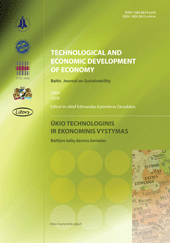Evaluation of Innovative Agricultural Extension Projects Using Novel Investment Tools
Evaluation of Innovative Agricultural Extension Projects Using Novel Investment Tools
Author(s): George Theodosiou, Fotios Chatzitheodoridis, Anastasios MichailidisSubject(s): Economy
Published by: Vilnius Gediminas Technical University
Keywords: agricultural extension; innovation; investment; Monte Carlo; real options; simulation
Summary/Abstract: This article extends the employment of novel investment evaluation tools into agricultural extension issues. In particular the concept of real options methodology has modulated, into an innovative agricultural project called “wema”, to model design flexibility in the realistically uncertain environment of information and communication technologies (ICT). Taking into account the great importance of ICTs, as the principal driver of change in agricultural areas, as well as the drastic increase in ICTs adoption over the last decade, a study evaluating the adoption parameters of ICTs can prove significantly valuable. Besides, any issue related to ICTs is extremely interesting and it belongs to the modern subject-matters of the agricultural economics science. Empirical results revealed that, according to the traditional criterion (Net Present Value), the implementation plan of the “wema” project is feasible. However, assuming the presence of uncertainty, application of a real options approach demonstrates that the Net Present Value may lead stakeholders to faulty decisions, as the innovative plan is rejected. The results indicate that the options have a significant value and highlight the fact that ignoring options value process can lead to a significant error. This obviously indicates the importance of combining the Net Present Value criterion in agricultural extension investments with the real options approach.
Journal: Technological and Economic Development of Economy
- Issue Year: 2010
- Issue No: 4
- Page Range: 703-716
- Page Count: 14
- Language: English

